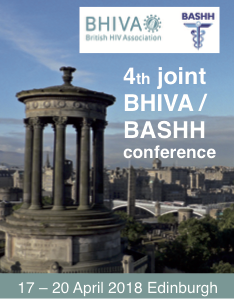UK-CAB community representation on guideline panels and research studies
21 May 2018. Related: Conference reports, Activism & advocacy, BHIVA/BASHH 4th Edinburgh 2018.
 Simon Collins, HIV i-Base
Simon Collins, HIV i-Base
A useful review of the involvement of HIV positive engagement in health policies and structures was presented at the 4th BNIVA/BASHH conference by Longret Kwardem.
This study reported results from semi-structured interviews with 13 community representatives (7 men, 6 women) in the UK Community Advisory Board (UK-CAB). Participants were sampled to provide diversity of roles, experience and demographics. with advocacy experience ranging from 1.5 to >20 years.
Interviews were carried out by two trained researchers who are also UK-CAB members. The format was similar to a study last year that interviewed health workers on their views and experiences of community reps. [2]
The interviews looked for examples of outcomes from community involvement and these included:
- Community reps wanted to ‘make a difference’ and their experience correlated with whether they perceived they had made an impact.
- Commonly cited benefits included: changes in trial design – particularly exclusion and inclusion criteria; inclusion in guidelines of overlooked issues; highlighting concerns of specific groups; bringing community perspectives; using community-friendly language; and improvements to clinics.
- Benefits from engaging in this work included: gaining respect and support from HIV professionals; increased learning opportunities; and giving back to their community.
- Reps reported valued UK-CAB support – training, networking, communicating through the forum – and accountability among activists.
However, sustainability for both individual and the CAB was also mentioned as one of the most difficult ongoing challenges, especially when more reps work in a voluntary capacity. Some responses commented that they had to give up work shifts in order to volunteer as reps.
As one comment quoted in the poster made clear: “We can do a lot as a network with little funding but can’t do anything with no funding”.
The UK-CAB is a network of more than 900 community activists across the UK, from more than 120 organisations. The poster reported that the UK-CAB currently has 10 community reps on 8 BHIVA sub-committees, 2 reps on 9 BHIVA guidelines panels and 40 community places on research studies and other policy groups.
Reference
1. Kwardem L et al. What impact do UKCAB representatives on guideline writing committees and academic/clinical research study boards make?
4th Joint BHIVA/BASHH Conference, 17–20 April 2018, Edinburgh. Poster abstract P273. Published in HIV Medicine, 19 (Suppl. 2), s21–s152.
http://www.bhiva.org/AnnualConference2018Presentations.aspx
http://www.ukcab.net/wp-content/uploads/2018/05/BHIVAPoster2018.pdf (PDF poster)
2. Kwardem L et al. (2017), ‘What is the impact of having UK-CAB representatives on guideline writing committees and academic/clinical research study boards?’ (Abstract). HIV Medicine, 18, Supp 1, p67.
http://www.ukcab.net/wp-content/uploads/2017/05/UK-CAB-BHIVA%C2%ADComRep-2017poster-V2.pdf (PDF poster)

